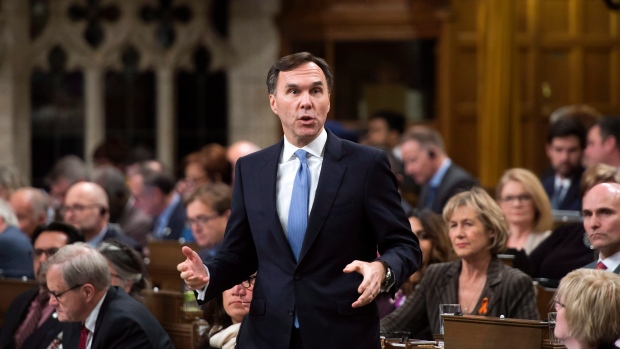Nov 28, 2017
Morneau calls opposition share-sale allegations 'absurd'
The Canadian Press

OTTAWA -- Finance Minister Bill Morneau is threatening to take the Conservatives to court after the official Opposition peppered him with questions about a stock sale that occurred before he introduced pension legislation in the House of Commons.
Morneau calls the insinuations by Tory finance critic Pierre Poilievre "absurd" and says they have "no basis in any sort of fact."
Poilievre says a motion introduced by Morneau in December 2015 to raise income taxes on the highest earners caused the entire stock market to drop -- including the price of Morneau Shepell shares, 680,000 of which the minister sold off a week before the announcement.
If Poilievre and others want to make such claims outside the Commons, where MPs enjoy the legal protection afforded by parliamentary privilege, they will be hearing from the minister's lawyers, Morneau suggested Tuesday in a hastily called news conference on Parliament Hill.
"If the Opposition want to continue with these absurd allegations, which have no basis in any sort of fact, they take them outside of the House and I will give them a sense of exactly how our legal system works," Morneau said.
"I am saying absolutely that if the members take the allegations that they're making inside the House outside the House, that they will be absolutely hearing how the legal system works from me."
Throughout question period Monday, Poilievre asked Morneau repeatedly if it was merely a coincidence that the 680,000 shares were sold off a week before the announcement.
Poilievre fired more than a dozen queries at Morneau on the subject. He asked Morneau repeatedly to confirm he was the 'someone' responsible for selling off about 680,000 shares in the company about a week before the tax-change announcement.
"That 'someone' would have saved a half a million dollars by avoiding the drop in the stock market that followed his introduction of tax measures in this House of Commons," Poilievre said.
"Was it just a coincidence that those two transactions line up so carefully? Or in fact did the minister jump the gun and sell his shares before he introduced his tax measures?"
Morneau refused to take the bait.
"Members across the way will continue to focus on me because they do not want to talk about what is actually going on," he said. "What is actually going on is the policies that we put in place are making a better situation for our economy and a better situation for Canadian families."
Daniel Lauzon, a spokesman for Morneau, later called Poilievre's insinuations "utterly false" and "absurd" -- and challenged the Tories to make the accusations outside the House of Commons, where members are not protected by parliamentary privilege.
Following question period and outside the House, where he was asked directly about his line of questioning and whether he believed the law had been broken, Poilievre demurred.
"We really have to know the details first -- I don't want to speculate," he said.
"We know that ministers have the ability to introduce tax changes on the floor of the House of Commons that could potentially affect stock prices and we think it is important that everybody have that information before that minister acts on it."
Morneau has been at the centre of an ethics controversy for weeks.
The ethics commissioner has launched a formal examination to determine if he was in a conflict of interest related to his work to introduce pension-reform legislation, which critics have insisted would benefit Morneau Shepell -- a company in which, until recently, Morneau owned about $21 million worth of shares.
Morneau was executive chairman of Morneau Shepell, which he helped build with his father, until shortly after the 2015 election and before he was named finance minister a couple of weeks later.
After the ethics controversy erupted, he sold off the remainder of his holdings in Morneau Shepell and vowed to place his other substantial assets in a blind trust.
Morneau donated the difference between what the shares were worth at the time of the sale and their value in 2015 when he was first elected -- an amount estimated at about $5 million.
He has also faced intense criticism about his integrity after information surfaced showing that, based on the ethics commissioner's advice, he did not divest shares or place his holdings in a blind trust after being was named to cabinet.
Morneau largely avoided the queries, although a spokesman later dismissed them as "aburd" and "utterly false."
